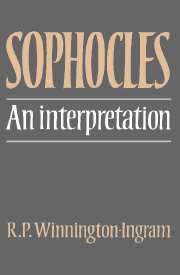Book contents
- Frontmatter
- Contents
- Preface
- Bibliography of short titles
- 1 Introductory
- 2 The mind of Ajax
- 3 The burial of Ajax
- 4 Trachiniae
- 5 Sophocles and the irrational: three odes in Antigone
- 6 Creon and Antigone
- 7 Fate in Sophocles
- 8 The fall of Oedipus
- 9 Furies in Sophocles
- 10 Electra
- 11 Oedipus at Colonus
- 12 Philoctetes
- 13 Heroes and gods
- Appendices
- A The Parodos of Trachiniae
- B Trachiniae 248ff.
- C Prometheus Vinctus 511–20
- D The Parodos of Electra
- E Locality in Oedipus Coloneus
- F Philoctetes 419ff.
- G The chronology of the plays
- Select index
B - Trachiniae 248ff.
Published online by Cambridge University Press: 07 December 2009
- Frontmatter
- Contents
- Preface
- Bibliography of short titles
- 1 Introductory
- 2 The mind of Ajax
- 3 The burial of Ajax
- 4 Trachiniae
- 5 Sophocles and the irrational: three odes in Antigone
- 6 Creon and Antigone
- 7 Fate in Sophocles
- 8 The fall of Oedipus
- 9 Furies in Sophocles
- 10 Electra
- 11 Oedipus at Colonus
- 12 Philoctetes
- 13 Heroes and gods
- Appendices
- A The Parodos of Trachiniae
- B Trachiniae 248ff.
- C Prometheus Vinctus 511–20
- D The Parodos of Electra
- E Locality in Oedipus Coloneus
- F Philoctetes 419ff.
- G The chronology of the plays
- Select index
Summary
There are features in Lichas' narrative which are extremely obscure; and it is not enough to say that we ought not to demand complete clarity from an embarrassed liar. It has long been recognized that what is impossibly obscure to us may have been relatively clear to the original audience or to a large section of it. What sources of information could Sophocles count on their knowing? The epic Oἰχαλíας ἅλωσις, no doubt. Panyassis' epic on Heracles? Sophocles himself may well have known this, if only through Herodotus, but one cannot assume that it was widely known in Athens. The notion that a recent stage treatment, e.g. the Eurytidae of Ion, lies behind the passage is attractive (cf. T. B. L. Webster, Hermes 71 (1936) 267), but neither Ion's tragedy nor his satyric Omphale can be dated. Since none of these sources is available to us, it is perhaps hardly worth speculating.
The basic lie of Lichas is about motives, not about facts. Heracles was thrown out when drunk (Lichas would never have invented so discreditable a story); he did kill Iphitus and was in servitude to Omphale – both traditional features. But (351ff.) it was not his servitude to Omphale in Lydia, i.e. his resentment of it, nor the death of Iphitus which led to it, that motivated his attack upon Oechalia, but his passion for Iole. When was that passion conceived?
The Messenger tells us, i.e. Lichas had said, that Heracles asked for Iole as a concubine (359f.), unsuccessfully. When? Hardly subsequent to the events of 262ff., including the slaying of Iphitus.
- Type
- Chapter
- Information
- Sophocles: An Interpretation , pp. 332 - 333Publisher: Cambridge University PressPrint publication year: 1980
- 1
- Cited by



